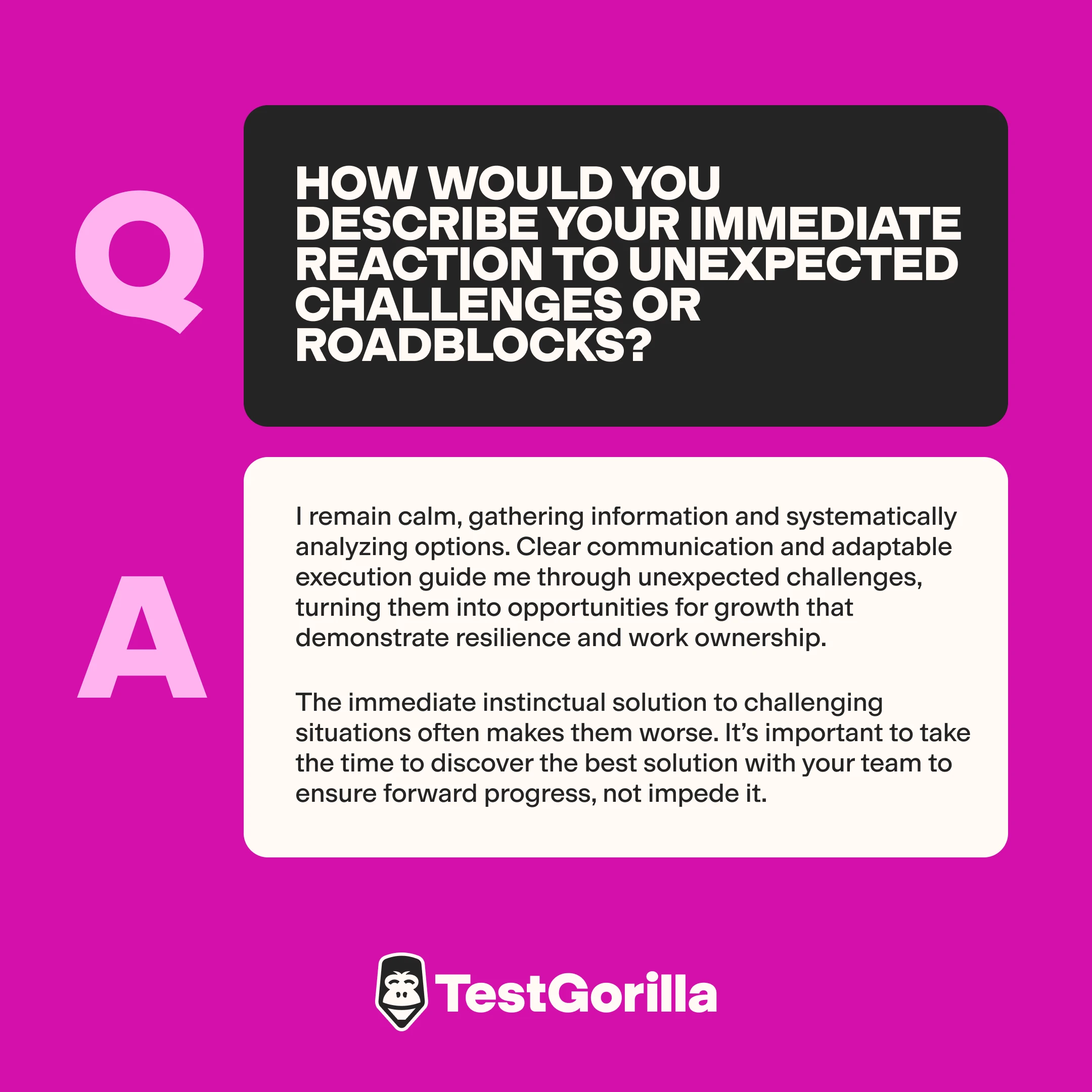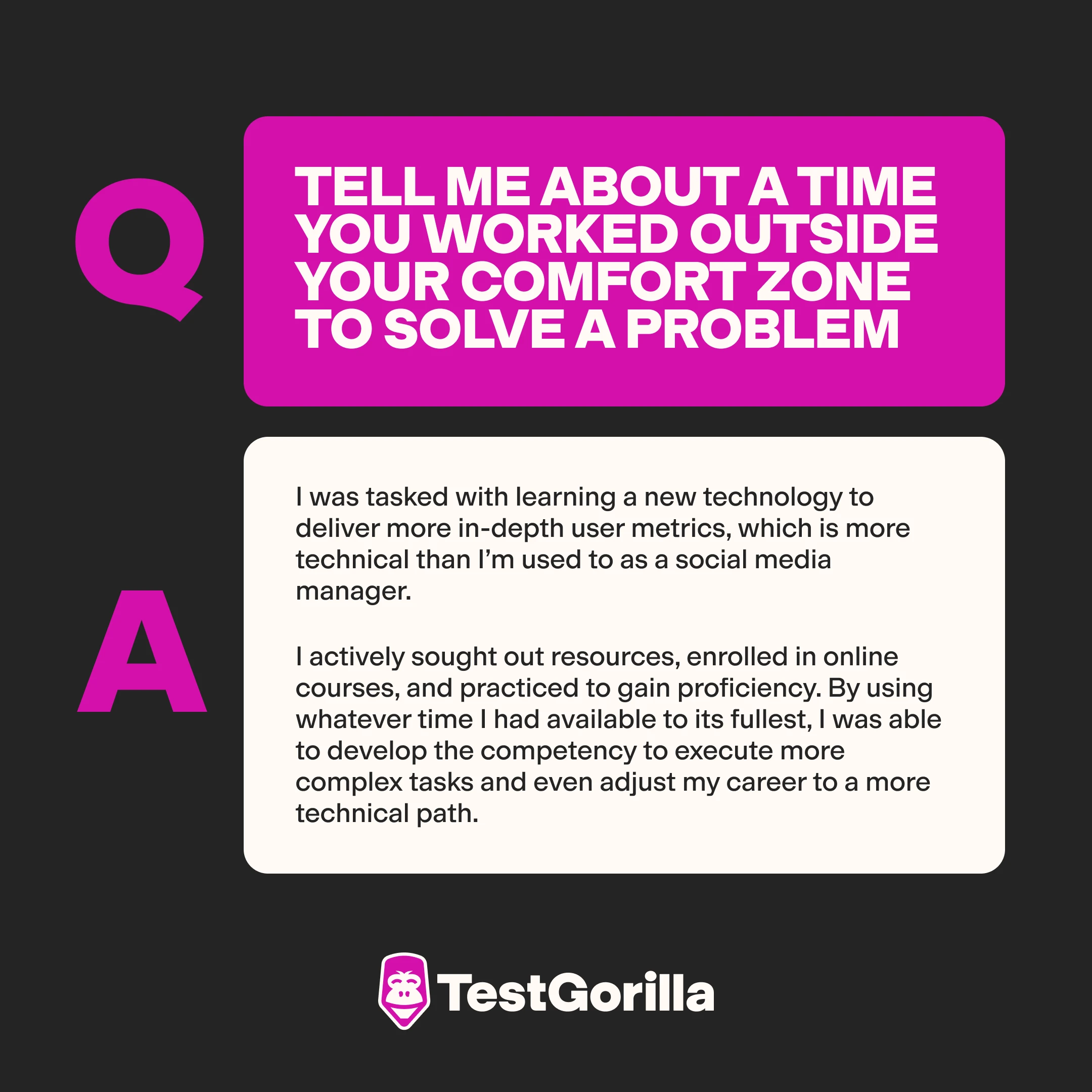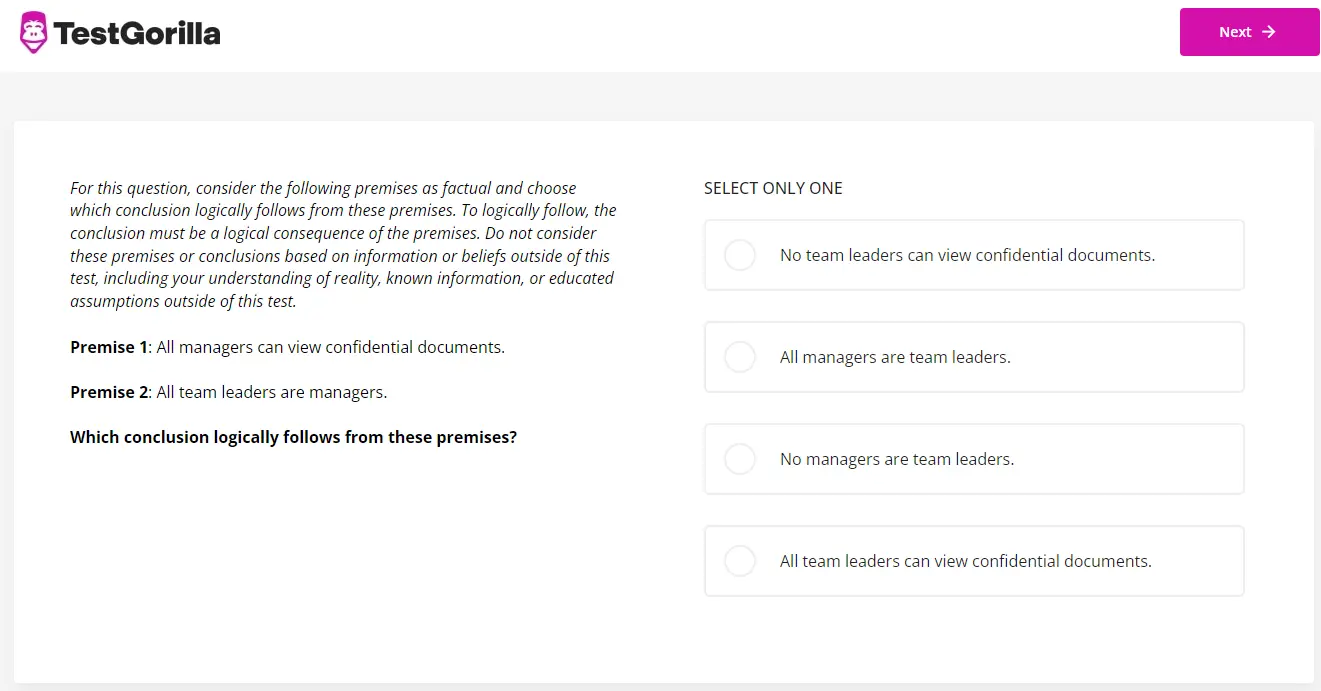12 problem solving interview questions and answers
Hire top problem solvers with less hassle
Every job requires problem solving skills, whether you’re a cashier working out how to process a coupon with a broken scanner or a busy executive dealing with supply chain issues.
he problem is that it’s difficult to demonstrate a candidate’s ability to problem-solve in an interview – or for employers and hiring managers to spot it.
Finding the truth requires the right variety of problem-solving questions asked in interviews. Unlike problem-solving questions people encounter in school, problem-solving questions for adults revolve around real-life situations that demonstrate innovative solutions.
In this article, we cover 12 problem-solving interview questions and answers to prepare for your next interview, whichever side of the table you’re on.
12 problem-solving interview questions and answers
It’s hard to prepare problem-solving questions for adults without some solid examples.
Let’s go through 12 essential job interview questions about problem-solving, including some problem-solving sample answers and explanations for how each one shows off the candidate’s problem-solving skills.
1. Is there an example of a time you had a deadline you weren’t able to meet? What happened? How did you handle it?
Missed deadlines are a fact of life, even for the best employees. What matters is how they learn from it.
This question poses an opportunity for candidates to show:
Authenticity in recounting their mistakes
Self-awareness about what went wrong – for example, did they display optimism bias, planning in too little time for a project?
How they learned from this past experience to improve their time management skills
Here’s an example of this in action:
Sample answer:
Early in my career, I faced a tight deadline for [project name] when a key team member unexpectedly left the company. I had not planned enough time into the schedule for things to go wrong.
I immediately took action by informing my supervisor and key stakeholders about the potential delay and offering a revised timeline based on a realistic assessment. Then, I worked with my team to redistribute responsibilities.
Through these efforts, we delivered the project with minimal delays and maintained client satisfaction.
I learned the importance of anticipating potential risks, building contingency plans, and fostering open communication with my team, and I’ve hit all my deadlines since then.
2. We work with many clients with multiple needs and aim to provide excellent service to them all. How would you prioritize each client’s needs?
This question tests customer service skills by laying out the candidate’s thought process on:
What information they look for when assessing a customer’s needs
What internal problem-solving processes and resources they consider when brainstorming solutions
How they prioritize and communicate their decision
Sample answer:
I would start by actively listening and analyzing data to understand each client's urgency, critical deadlines, and potential impact on revenue and retention.
I would then rank each need by the most urgent and shortest deadlines. I would work on those with the highest importance and immediacy first.
I would also allocate resources strategically by balancing this with our team's bandwidth and skill sets. Transparency is important while I communicate the prioritization process and explore collaborative solutions when necessary.
3. How would you describe your immediate reaction to unexpected challenges or roadblocks?
Different personality types respond differently under pressure, and answers to this question help you gauge whether the candidate would be a good fit for your workplace culture.
For example, while some organizations prefer people who can deliver quick, on-the-spot solutions, others prefer those who take their time to strategize their next steps and prioritize teamwork over finding effective solutions alone.
Sample answer:
I remain calm, gathering information and systematically analyzing options. Clear communication and adaptable execution guide me through unexpected challenges, turning them into opportunities for growth that demonstrate resilience and work ownership.
The immediate instinctual solution to challenging situations often makes them worse. It’s important to take the time to discover the best solution with your team to ensure forward progress, not impede it.
4. Describe a time when you had to change your strategy at the last minute. How did you handle this difficult situation?
Problem solving skills are especially important in high-pressure situations when there’s little time to choose a course of action.
This question enables candidates to show:
Their ability to manage stress
Their decision-making process
How they maintained a professional image
The creative solution they came up with and its success
Sample answer:
During one of my client presentations, the demo unexpectedly malfunctioned moments before going live.
Instead of panicking, I calmly assessed the situation and reassured the clients. Next, I used my knowledge of the product's functionalities to deliver a compelling, descriptive narrative without the demo.
Finally, I collaborated and communicated with my team to find alternative means for the clients to try the product for themselves at a later time. They were excited, so the outcome was a successful presentation and a secured deal.
5. Can you think of a previous experience where you saw an opportunity in a potential problem? What did you do? What was the outcome?
If an organization prides itself on innovation or if the role in question is creative, candidates must be able to spot ways to use obstacles to their advantage.
This question gives interviewees a chance to demonstrate how they use their analytical skills to look for ways to turn a bad situation around rather than simply mitigate it.
Sample answer:
Due to the seasonal nature of our work, my team encountered a yearly “slow period” where revenue, engagement, and productivity dropped. Upper management was on the verge of issuing mass layoffs to transition to hiring seasonal employees instead.
Rather than letting my team get laid off, I talked to upper management and took the opportunity to organize planning, training, and team-building activities to boost engagement and productivity in preparation for the busy season.
Our employee satisfaction scores increased, and when busier weeks resumed, we increased revenue year-over-year.
6. Describe the biggest work-related problem you have experienced. How did you deal with it?
Answering this question reveals:
What candidates consider big problems at work
How they prioritize and delegate tasks
How successful their efforts are
Employers can then evaluate how much pressure candidates can handle and whether they’d be a good fit for the specific role.
Sample answer:
I faced a huge challenge when I had to launch a new marketing campaign within a shortened time frame.
My problem-solving approach involved prioritizing my tasks based on urgency and impact, delegating effectively, and focusing on critical activities.
I also explored alternative options, such as repurposing existing assets and collaborating with freelancers to mitigate delays and stay within budget.
My efforts and resourcefulness paid off. We launched the campaign on time and within budget, exceeding everyone's expectations.
7. Tell me about a time you had to explain a complex technical concept to someone with no prior knowledge.
In technical roles, employees require soft skills such as strong workplace communication skills to explain their decisions to stakeholders.
This question gives them a chance to demonstrate simplification, audience awareness, and teaching ability.
Sample answer:
In a previous role, I often broke down concepts by splitting them into simple steps and using relatable analogies.
For instance, I was asked in the middle of a sprint by a senior leader to build a new chart in our business intelligence platform. They thought I could do this in an hour, but in reality, I would have to build a new data model, which takes several days.
I explained that it’s like trying to order an off-menu dish at a restaurant. You think they already have all the ingredients in the kitchen, but they would actually have to order new ingredients from out of state and design a new recipe, which takes time.
8. How do you deal with problems when you don’t have access to all the necessary information? Can you describe a time when this occurred?
The most difficult problems to solve are the ones without clear variables. This is often required in higher-up roles managing teams or departments.
This question lets candidates show common problem-solving strategies, such as investigating the causes of an issue, prioritizing tasks, and creating agile responses.
Sample answer:
I consider potential outcomes and prepare for multiple scenarios so I can adjust as I go.
For instance, I was managing my boss’s schedule when she was traveling for a conference, and I didn’t know her availability for meetings beyond a rough agenda.
I planned for the most likely scenario and prepared alternatives, for example, clearing time the following week for any meetings that she couldn’t attend so I could immediately reschedule canceled meetings and minimize disruption.
9. Tell me about a time you worked outside your comfort zone to solve a problem.
Asking this question helps gauge a candidate's flexibility, initiative, willingness to learn, and commitment to self-improvement in a work environment.
Sample answer:
I was tasked with learning a new technology to deliver more in-depth user metrics, which is more technical than I’m used to as a social media manager.
I actively sought out resources, enrolled in online courses, and practiced to gain proficiency. By using whatever time I had available to its fullest, I was able to develop the competency to execute more complex tasks and even adjust my career to a more technical path.
10. What was the most stressful situation you faced at work? How did you handle it?
This is a behavioral interview question that lets candidates show off their:
Proactiveness
Analytical approach
Resourcefulness
Communication
Ability to learn from challenges
For best results, use it in conjunction with objective measurements like critical thinking skills tests.
Try TestGorilla today to improve your hiring process
Register for our free live demo and see how our tests can bring verified problem-solving skills into your organization.
Sample answer:
I had to launch a complex software project with a tight deadline and several unexpected technical glitches.
I handled it by prioritizing ruthlessly, creating a detailed task list, identifying critical activities, and delegating non-essential tasks to free up my time. I also communicated transparently with my team and stakeholders.
As a result, we launched the project on time, and I ultimately strengthened my leadership skills.
11. What is your process for evaluating the advantages and disadvantages of a solution?
Particularly when undergoing the interview process for leadership roles, candidates must show they know how to break down a problem and weigh options based on best practices.
Sample answer:
When faced with multiple solutions to a problem, I take the four-step approach to problem-solving suggested by Daniel Markovitz:
I examine the data available to me
I frame the problem based on observable facts and allow for more than one solution
I think backward from the problem to ensure I understand the causes
When examining solutions, I ask “why,” ensuring each solution addresses the root causes
I rank each solution based on these factors, using a matrix if necessary, and take action based on which hits the most marks.
12. Have you ever had to alter your plans when solving a complex problem?
It’s important that candidates don’t commit so hard to one solution to a problem that they ignore opportunities to adapt and achieve a better result.
This question gives candidates a chance to demonstrate their adaptability, troubleshooting skills, and ability to recognize sunk costs.
Sample answer:
I was managing the development of a project management tool when the client told me they urgently needed a new feature.
My coworkers told me this would be impossible in the given workflow timeframe because the feature would take several weeks to code and test. The client said this was unacceptable and threatened to cancel their contract.
Instead of panicking, I discussed with the client what they wanted the feature to accomplish. They explained that they wanted to use an old project as a template for a new one. I realized this capability existed in our current software when we performed stress tests during early development.
I relayed this back to the dev team, who were able to quickly adjust the internal testing feature to the client’s needs rather than building something from scratch.
Enhance problem solving interviews with TestGorilla
With skills-based hiring, you ensure that everyone you bring into the hiring process already has a base level of problem-solving abilities.
This is something resumes cannot do: Research shows that pre-hire work experience is a poor predictor of job performance and retention.
By contrast, 70% of employers agree that skills-based hiring is more effective than resumes. That’s a key reason why your job descriptions should focus on skills like problem-solving from the jump (pro tip: take a look at this assistant director template for a detailed example).
Skills testing also benefits candidates because it is less prone to bias.
In one study, the number of women hired into senior roles increased by nearly 70% when skills-based hiring methods were used.
Use talent assessments like our Problem solving skills test to create your shortlist with questions like this:
You should also test for other skills like:
Analytical skills and attention to detail
Communication and active listening skills
Critical thinking
Combining different types of assessments and interviews gives you a more holistic view of a candidate's strengths, weaknesses, and overall fit for the role.
For instance, critical thinking is an important supporting skill for problem-solving because it helps employees evaluate any information they gather and make logical conclusions when deciding on the best course of action.
Here’s an example of a question from our Critical Thinking test:
You can then use this information to inform your interview approach, such as asking candidates how they plan to improve their skills in their lower-scoring areas
This helps you improve your workforce: Deloitte research shows that skills-based organizations are more than twice as likely to innovate than traditional ones.
Find candidates with the skills you need with TestGorilla
Waste no time finding the right skills with TestGorilla. Sign up for a free account and see how our tests can create an automatic shortlist of the most skilled candidates.
The best insights on HR and recruitment, delivered to your inbox.
Biweekly updates. No spam. Unsubscribe any time.
Combine problem solving interview questions with targeted skills testing with TestGorilla
In this article, we’ve explored how to ask and answer problem-solving questions for interviews.
We’ve also included specific examples of answers to problem-solving questions, covering everything from handling stress to explaining complex concepts.
To ensure you don’t waste any of your dynamite interview questions for problem solving on unqualified candidates, incorporate problem solving skills tests into your hiring.
Take a product tour of TestGorilla today, or sign up for a demo to see our tests in action.
Then, try them for yourself by signing up for a Free forever plan!
Problem solving interview questions FAQs
Still unsure about writing or answering interview questions on problem solving? Here are the answers to common queries about problem-solving questions in interviews.
Why do employers look for problem solving skills?
Employers look for problem solving skills because, in every role, employees encounter obstacles they must overcome to keep their teams and customers happy. The better your problem-solving skills, the better you can maintain and even improve your performance after setbacks.
What is an example of problem solving in the workplace?
An example of problem-solving in the workplace is when a project manager has to manage the fallout from missing an important deadline. When an unexpected problem arises, they have to find a way to solve it and the knock-on problems it causes – for instance, managing clients’ expectations and feedback.
What are good examples of problem solving interviews?
Some good examples of problem solving interview questions are:
Have you ever had a deadline you weren’t able to meet? What happened? How did you handle it?
We work with many clients with multiple needs and aim to provide excellent service to all of them. How would you prioritize each client’s needs?
Related posts
You've scrolled this far
Why not try TestGorilla for free, and see what happens when you put skills first.





















